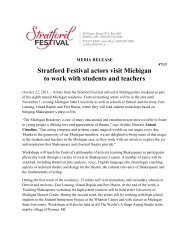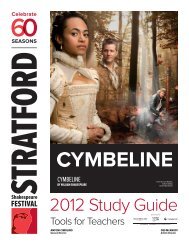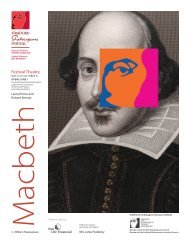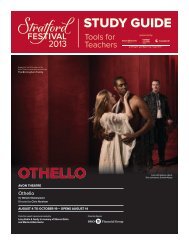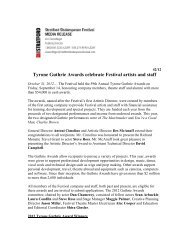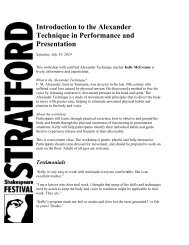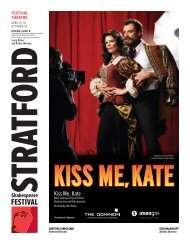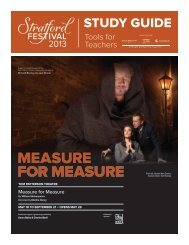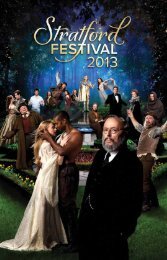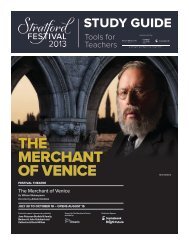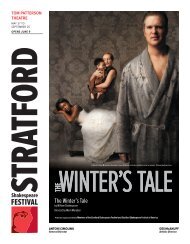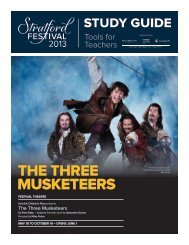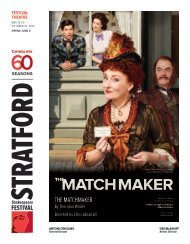RichaRd iii - Stratford Festival
RichaRd iii - Stratford Festival
RichaRd iii - Stratford Festival
Create successful ePaper yourself
Turn your PDF publications into a flip-book with our unique Google optimized e-Paper software.
Statecraft and Stagecraft<br />
in Richard III<br />
by Jane Freeman<br />
Shakespeare wrote Richard III in the early 1590s,<br />
and it was his first big hit. It was performed often<br />
during his life and reprinted more frequently before<br />
his death than any of his plays except Henry IV,<br />
Part 1. Elizabethan audiences would have entered<br />
the theatre knowing the story from several sources.<br />
What they might not have predicted was that<br />
seeing history through the eyes of a charismatic<br />
villain could be so much fun.<br />
The story they knew was dramatic. Richard,<br />
Duke of Gloucester, an evil man with a twisted<br />
character and a twisted back, wanted to be king<br />
but he was not heir to the throne. Using subterfuge<br />
and violence, he would remove all obstacles in his<br />
path: his brother George, his brother King Edward’s<br />
power-seeking in-laws, uncooperative noblemen<br />
and – most infamously – his young nephews.<br />
This unnatural monster would be rightfully killed<br />
at the Battle of Bosworth by Henry Tudor, the<br />
Earl of Richmond, who would become the first<br />
Tudor monarch, King Henry VII. We know, though<br />
Shakespeare’s audience probably did not, that<br />
several of the facts of Richard III’s famous villainy<br />
are fictions, generated by the “Tudor propaganda<br />
machine” for political gain.<br />
Richard III is the fourth play in a series (the others<br />
being the three parts of Henry VI) that tells the story<br />
2<br />
Below | Director Miles Potter with MeMbers of the coMPany in rehearsal.<br />
Facing page, From top| seana McKenna (richarD <strong>iii</strong>), roberta Maxwell<br />
(Duchess of yorK) anD Martha henry (Queen Margaret); yanna Mcintosh<br />
(Queen elizabeth) Following page | brenDan Murray (archbishoP) anD<br />
wayne best (DuKe of bucKinghaM) with MeMbers of the coMPany;<br />
seana McKenna; gareth Potter (richMonD) anD Director Miles Potter.<br />
PhotograPhy by erin saMuell.<br />
of the Wars of the Roses: the civil war between<br />
the houses of York and Lancaster for the throne of<br />
England. Richard starts the series as a loyal brother,<br />
but by the third play he has revealed in soliloquy<br />
both his desire to be king and the means by which<br />
he hopes to succeed:<br />
Why, I can smile, and murder whiles I smile,<br />
And cry “Content” to that which grieves my heart,<br />
And wet my cheeks with artificial tears,<br />
And frame my face to all occasions. . . .<br />
I can add colours to the chameleon,<br />
Change shapes with Proteus for advantages,<br />
And set the murderous Machiavel to school.<br />
Can I do this, and cannot get a crown?<br />
Tut, were it farther off, I’ll pluck it down.<br />
– Henry VI, Part 3, Act III, scene 2<br />
Like other theatrical Machiavels of the period,<br />
all of whom draw on popular interpretations of<br />
Machiavelli’s The Prince (published in 1532), Richard<br />
is a quick-witted political strategist who is willing<br />
to use immoral means to achieve his ends. He has<br />
more lines than any other Shakespearean character<br />
except Hamlet and speaks many of them directly<br />
to the audience, thereby making us his confidants.<br />
He is self-consciously theatrical: he performs roles<br />
such as “loving brother” and “devout Christian” in



